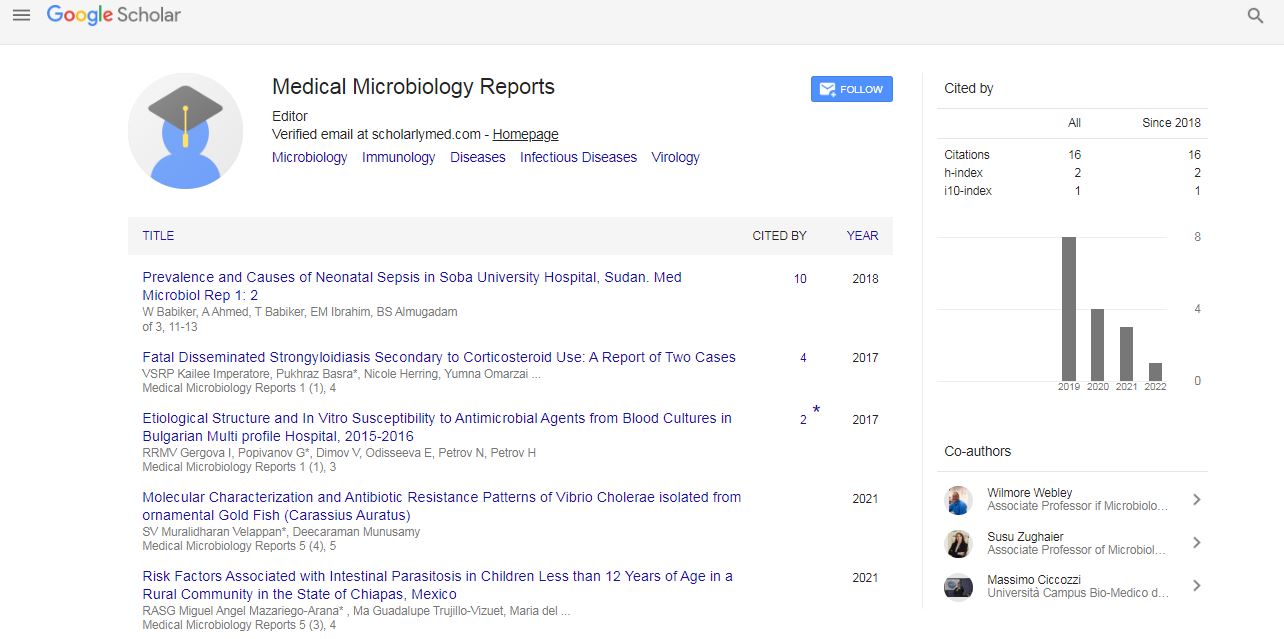Commentary, Med Microbiol Rep Vol: 7 Issue: 3
Significance of Bacteriology: Its Impact on Human Health and Environmental Implications
Linda Francois*
Department of Microbiology, University of Yaounde, Yaounde, Cameroon
*Corresponding Author: Linda Francois,
Department of Microbiology, University
of Yaounde, Yaounde, Cameroon
E-mail: francoisLin_da@gmail.com
Received date: 01 September, 2023, Manuscript No. MMR-23-117640;
Editor assigned date: 04 September, 2023, PreQC No. MMR-23-117640 (PQ);
Reviewed date: 18 September, 2023, QC No. MMR-23-117640;
Revised date: 25 September, 2023, Manuscript No. MMR-23-117640 (R);
Published date: 02 October, 2023 DOI: 10.4172/MMR.1000346
Citation: Francois L (2023) Significance of Bacteriology: Its Impact on Human Health and Environmental Implications. Med Microbiol Rep 7:3.
Description
Bacteriology is an essential branch of microbiology that focuses on the study of bacteria. Bacteria are among the most ancient and abundant forms of life on Earth, and they play a crucial role in various ecological, industrial, and medical processes. In this article, we will delve into the world of bacteriology, exploring its history, significance, methods, and its impact on various aspects of our lives.
Significance of bacteriology
Bacteriology is of paramount importance in various domains, impacting human health, ecology, biotechnology, and industry. Here are some key areas where bacteriology plays a significant role:
Medical bacteriology: Bacteriology is fundamental in diagnosing and treating infectious diseases. It has led to the development of antibiotics, vaccines, and advanced diagnostic tools. Additionally, it is crucial for understanding antimicrobial resistance, which is a global health threat.
Environmental bacteriology: Bacteria are essential for the biogeochemical cycling of nutrients in ecosystems. They participate in processes such as nitrogen fixation, decomposition, and waste treatment. Environmental bacteriology helps us understand and manage these crucial processes.
Biotechnology: Bacteriology is the backbone of modern biotechnology. Bacteria are used to produce a wide range of bioproducts, including insulin, enzymes, and bioplastics. Genetic engineering techniques have further expanded the possibilities of manipulating bacteria for various applications.
Food and beverage industry: Understanding bacteria is vital in food safety and preservation. Bacteriology is used to develop strategies for preventing foodborne illnesses and extending the shelf life of food products.
Industrial processes: Bacteria are employed in various industrial processes, such as the production of biofuels, bioremediation of pollutants, and the synthesis of chemicals and pharmaceuticals. Bacteriology guides these applications.
Impact on human health
Bacteriology has made profound contributions to the field of medicine and public health. It has been instrumental in:
Disease identification: Bacteriology allows for the identification of pathogenic bacteria responsible for diseases, leading to accurate diagnoses and targeted treatment.
Vaccine development: Understanding bacterial pathogens has led to the development of vaccines, preventing diseases like diphtheria, tetanus, and pertussis.
Antibiotics: The discovery of antibiotics, like penicillin, revolutionized medicine. Bacteriology continues to be crucial in the search for new antibiotics and in understanding antibiotic resistance.
Infection control: Bacteriology informs infection control measures in healthcare settings, reducing the risk of nosocomial infections.
Public health: Monitoring and surveillance of bacterial diseases are essential for public health. Bacteriology plays a pivotal role in disease outbreak investigation and prevention.
Environmental implications
In the realm of ecology, bacteriology is indispensable. Bacteria influence ecosystems in various ways:
Biogeochemical cycling: Bacteria are key players in the cycling of essential nutrients like carbon, nitrogen, and sulfur. They decompose organic matter and recycle nutrients, maintaining ecosystem health.
Bioremediation: Certain bacteria can degrade pollutants and toxins. This is harnessed in bioremediation efforts to clean up contaminated environments.
Symbiotic relationships: Bacteria form symbiotic relationships with plants (rhizobacteria), aiding in nutrient uptake, and with animals (e.g., gut microbiota), influencing digestion and overall health.
Microbial ecology: Studying bacterial communities helps ecologists understand the intricate relationships between microorganisms and their environment.
 Spanish
Spanish  Chinese
Chinese  Russian
Russian  German
German  French
French  Japanese
Japanese  Portuguese
Portuguese  Hindi
Hindi 
